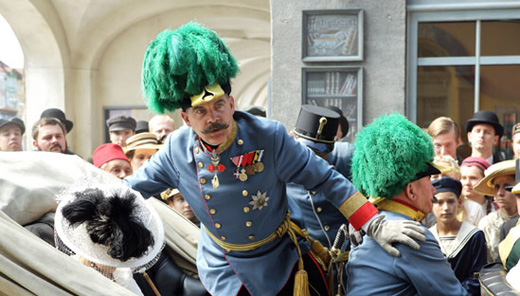
This year’s South East European Film Festival in Los Angeles started with the world premiere of Sarajevo, an Austrian feature about the assassination of Archduke Franz Ferdinand. The liquidation of the heir presumptive of the Austro-Hungarian throne in Sarajevo, the capital of the empire’s Bosnia and Herzegovina province, took place 100 years ago on June 28, 1914. The shooting, believed to be carried out by members of the Serbian extremist group “Black Hand,” triggered the events that erupted into World War I a month later, on July 28.
Like Oliver Stone in 1991’s seminal JFK, Sarajevo‘s director Andreas Prochaska and writer Martin Ambrosch have created a counter-narrative to the official version of events as to why the archduke was shot. Their counter-version is full of dark conspiracy theories. Immediately after Ferdinand’s slaying the authorities task examining magistrate Dr. Leo Pfeffer (Florian Teichtmeister) to investigate the crime. A bicycle-riding loyal servant of the state, Pfeffer does so, but in the course of his formal investigation, like New Orleans District Attorney Jim Garrison in JFK, Pfeffer uncovers unsettling evidence indicating that something is seriously amiss.
As in the JFK case, there are irregularities with the archduke’s motorcade and lax security measures for the royal passage through Sarajevo’s streets, as well as the revelation in advance of the parade route in the press.
However, unlike the Kennedy assassination, wherein the “lone gunman” was the sanctioned story, a ring of Serbian co-conspirators is implicated in the archduke’s murder. Pfeffer is pressured by high-ranking Austro-Hungarian politicians, law enforcement authorities and military men to hastily sign onto a concocted Warren Commission-type report that claims the government of Serbia backed the Black Hand assassins. But Pfeffer, insisting on due diligence, smells a rat. When he balks at initialing the bogus report, the converted Jew’s ancestry is thrown back in Pfeffer’s face by anti-Semitic officials.
Sarajevo skillfully unravels like a police procedural and becomes a political thriller crossed by a whodunit. But more important than who actually shot Ferdinand is: Why was he killed? The movie mystery includes many film noir conventions, such as the outside investigator who follows his internal moral code versus establishment bureaucrats, and for good measure, a high society dame is thrown into the mix, with Melika Forouton portraying the swanky Serbian Marija Jeftanovic. And in a nod to the post-9/11 “War on Terror,” imprisoned Serbians are waterboarded, tortured, and held in Abu Ghraib-type squalor.
Like a dog with a bone, Pfeffer pursues the truth, uncovering the hidden hand of Austro-Hungarian and German military intelligence services, which have their own sinister agendas. According to the film’s conspiracy theory, the liberal-minded archduke wanted to grant the empire’s ethnic groups greater autonomy, so reactionary forces eliminated him before he could ascend to the throne. Plus, his orchestrated death provided the pretext Austro-Hungarian and German hawks needed to declare war on Serbia. Coincidentally (?), Sarajevo is also timed for the 50th anniversary of the falsified Aug. 2, 1964, Gulf of Tonkin incident, which provided another warmonger, Lyndon Johnson, with the pretext to escalate the Vietnam War.
As everyone knows, the Austro-Hungarian and German plot (if that’s what it was) resulted in the carnage of World War I, one of the greatest bloodbaths in human history that laid waste to the Empire and Germany.
Sarajevo is reminiscent of another classic movie set in South East Europe – Costa-Gavras’ Academy Award winning Z. In this 1969 masterpiece, Greece’s liberal-minded candidate (movingly played by Yves Montand) is assassinated by a high-ranking right-wing conspiracy, and a prosecutor who is a faithful functionary of the state (Jean-Louis Trintignant) stumbles upon the truth. But Prochaska’s carefully calibrated Sarajevo moves more deliberately than the rapidly paced Z.
World War I’s unprecedented mass murder and mayhem, set into motion by incendiary events in South East Europe, inspired many of cinema’s greatest antiwar movies, including All Quiet on the Western Front, La Grande Illusion, Paths of Glory, King of Hearts, Oh! What a Lovely War, and Gallipoli. The well-acted, well-made Sarajevo, with its vivid cinematography and compelling anti-imperial conspiracy theory – purported to be historically-based – propels this film into their ranks as one of the great pacifist pictures incited by the “Great War.” A hundred years on, Sarajevo reminds us that war is the ultimate not-so-glorious grand illusion – and still hell.
For more info about the 2014 South East European Film Festival see: seefilmla.org. Watch local theaters for release of Sarajevo.
Movie information:
Sarajevo
Directed by Andreas Prochaska
2014, Austria/Germany, 2 hours
Photo: A scene from Sarajevo. Betafilm.com









Comments